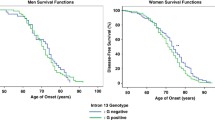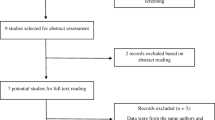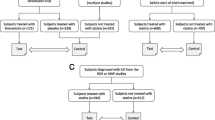Abstract
Effects of statins over clinical changes in Alzheimer’s disease (AD) are usually non-significant, but epistatic interactions between genetic variants involved in cholesterol metabolism could be important for such effects. We aimed to investigate whether LDLR single-nucleotide polymorphisms rs11669576 (LDLR8), rs5930 (LDLR10), and rs5925 (LDLR13) are associated with cognitive and functional changes in AD, while also considering APOE haplotypes and lipid-lowering treatment with lipophilic statins for stratification. Consecutive outpatients with late-onset AD were screened with cognitive tests, while caregivers scored functionality and caregiver burden, with prospective neurotranslational correlations documented for 1 year. For 179 patients, minor allele frequencies were 0.078 for rs11669576–A (14.5% heterozygotes), 0.346 for rs5930–A (42.5% heterozygotes), and 0.444 for rs5925–C (56.4% heterozygotes), all in Hardy-Weinberg equilibrium; 134 patients had hypercholesterolemia, and 133 used lipophilic statins. Carriers of rs11669576–G had faster cognitive decline, while functional decline was slower for carriers of rs11669576–A who used lipophilic statins. APOE-ε4 carriers who also carried rs5930–AA had improved caregiver burden, while carriers of haplotypes that included rs5930–AG had worse cognitive and functional outcomes, though carriers of the A allele of rs5930 had better cognitive and functional response to lipophilic statins. APOE-ε4 non-carriers who carried rs5925–TT had slower cognitive decline, while lipophilic statins protected carriers of the other genotypes. We preliminarily conclude that reportedly protective variants of LDLR and APOE against risk of AD also slowed cognitive decline, regardless of cholesterol variations, while therapy with lipophilic statins might benefit carriers of specific genetic variants.


Similar content being viewed by others
References
Barbosa FAF, de Labio RW, Rigolin VOS, Minett T, Bertolucci PHF, Smith MAC, Payão SLM (2006) Apolipoprotein A-V gene polymorphism –1131T>C and Alzheimer’s disease. J Alzheimers Dis 10:365–369
Bertolucci PHF, Brucki SMD, Campacci SR, Juliano Y (1994) The mini-mental state examination in an outpatient population: influence of literacy. Arq Neuropsiquiatr 52:1–7
Cacabelos R, Torrellas C, Tejido O, Carril JC (2016) Pharmacogenetic considerations in the treatment of Alzheimer’s disease. Pharmacogenomics 17:1041–1074
Chapman J, Wang N, Treves TA, Korczyn AD, Bornstein NM (1998) ACE, MTHFR, factor V Leiden, and APOE polymorphisms in patients with vascular and Alzheimer’s dementia. Stroke 29:1401–1404
Chen DW, Yang JF, Tang Z, Dong XM, Feng XL, Yu S, Chan P (2008) Cholesteryl ester transfer protein polymorphism D442G associated with a potential decreased risk for Alzheimer's disease as a modifier for APOE ε4 in Chinese. Brain Res 1187:52–57
Chen ES, Mazzotti DR, Furuya TK, Cendoroglo MS, Ramos LR, Araujo LQ, Burbano RR, Smith MAC (2010) Association of PPARα gene polymorphisms and lipid serum levels in a Brazilian elderly population. Exp Mol Pathol 88:197–201
Crameri A, Biondi E, Kuehnle K, Lütjohann D, Thelen KM, Perga S, Dotti CG, Nitsch RM, Ledesma MD, Mohajeri MH (2006) The role of seladin-1/DHCR24 in cholesterol biosynthesis, APP processing and Aβ generation in vivo. EMBO J 25:432–443
De Luca V, Orfei MD, Gaudenzi S, Caltagirone C, Spalletta G (2016) Inverse effect of the APOE epsilon4 allele in late- and early-onset Alzheimer’s disease. Eur Arch Psychiatry Clin Neurosci 266:599–606
De Oliveira FF, Bertolucci PHF, Chen ES, Smith MAC (2014a) Pharmacological modulation of cognitive and behavioral symptoms in patients with dementia due to Alzheimer’s disease. J Neurol Sci 336:103–108
De Oliveira FF, Bertolucci PHF, Chen ES, Smith MC (2014b) Risk factors for age at onset of dementia due to Alzheimer’s disease in a sample of patients with low mean schooling from São Paulo, Brazil. Int J Geriatr Psychiatry 29:1033–1039
De Oliveira FF, Wajman JR, Bertolucci PHF, Chen ES, Smith MC (2015a) Correlations among cognitive and behavioural assessments in patients with dementia due to Alzheimer’s disease. Clin Neurol Neurosurg 135:27–33
De Oliveira FF, Pivi GAK, Chen ES, Smith MC, Bertolucci PHF (2015b) Risk factors for cognitive and functional change in one year in patients with Alzheimer's disease dementia from São Paulo, Brazil. J Neurol Sci 359:127–132
De Oliveira FF, Chen ES, Smith MC, Bertolucci PHF (2017) Longitudinal lipid profile variations and clinical change in Alzheimer’s disease dementia. Neurosci Lett 646:36–42
De Oliveira FF, Berretta JM, Almeida Junior GV, Almeida SS, Chen ES, Smith MC, Bertolucci PHF (2019) Pharmacogenetic analyses of variations of measures of cardiovascular risk in Alzheimer’s dementia. Indian J Med Res 150:261–271
Eckert GP, Wood WG, Müller WE (2005) Statins: drugs for Alzheimer’s disease? J Neural Transm 112:1057–1071
Gopalraj RK, Zhu H, Kelly JF, Mendiondo M, Pulliam JF, Bennett DA, Estus S (2005) Genetic association of low density lipoprotein receptor and Alzheimer’s disease. Neurobiol Aging 26:1–7
Grundman M, Petersen RC, Ferris SH, Thomas RG, Aisen PS, Bennett DA, Foster NL, Jack CR Jr, Galasko DR, Doody R, Kaye J, Sano M, Mohs R, Gauthier S, Kim HT, Jin S, Schultz AN, Schafer K, Mulnard R, van Dyck CH, Mintzer J, Zamrini EY, Cahn-Weiner D, Thal LJ (2004) Mild cognitive impairment can be distinguished from Alzheimer disease and normal aging for clinical trials. Arch Neurol 61:59–66
Grundy SM, Cleeman JI, Merz CNB, Brewer HB Jr, Clark LT, Hunninghake DB, Pasternak RC, Smith SC Jr, Stone NJ (2004) Implications of recent clinical trials for the National Cholesterol Education Program Adult Treatment Panel III Guidelines. Circulation 110:227–239
Jiang Q, Lee CYD, Mandrekar S, Wilkinson B, Cramer P, Zelcer N, Mann K, Lamb B, Willson TM, Collins JL, Richardson JC, Smith JD, Comery TA, Riddell D, Holtzman DM, Tontonoz P, Landreth GE (2008) ApoE promotes the proteolytic degradation of Aβ. Neuron 58:681–693
Katz S, Akpom CA (1976) A measure of primary socio-biological functions. Int J Health Serv 6:493–508
Larsson SC, Markus HS (2018) Does treating vascular risk factors prevent dementia and Alzheimer’s disease? A systematic review and meta-analysis. J Alzheimers Dis 64:657–668
Lawton MP (1988) Instrumental Activities of Daily Living (IADL) Scale: self-reported version. Psychopharmacol Bull 24:789–791
Leduc V, Théroux L, Dea D, Dufour R, Poirier J (2016) Effects of rs3846662 variants on HMGCR mRNA and protein levels and on markers of Alzheimer’s disease pathology. J Mol Neurosci 58:109–119
Lee CYD, Landreth GE (2010) The role of microglia in amyloid clearance from the AD brain. J Neural Transm 117:949–960
Leon M, Sawmiller D, Giunta B, Tan J (2018) Therapeutic approach targeting apolipoprotein E binding region and low-density lipoprotein receptor for Alzheimer’s disease. Neuroimmunol Neuroinflammation 5:30
Lim YY, Ellis KA, Pietrzak RH, Ames D, Darby D, Harrington K, Martins RN, Masters CL, Rowe C, Savage G, Szoeke C, Villemagne VL, Maruff P (2012) Stronger effect of amyloid load than APOE genotype on cognitive decline in healthy older adults. Neurology 79:1645–1652
Lima APV, Castilhos R, Chaves MLF (2017) The use of the clinical dementia rating scale sum of boxes scores in detecting and staging cognitive impairment/dementia in Brazilian patients with low educational attainment. Alzheimer Dis Assoc Disord 31:322–327
Loera-Valencia R, Goikolea J, Parrado-Fernandez C, Merino-Serrais P, Maioli S (2019) Alterations in cholesterol metabolism as a risk factor for developing Alzheimer’s disease: potential novel targets for treatment. J Steroid Biochem Mol Biol 190:104–114
Maxwell WD, Ramsey LB, Johnson SG, Moore KG, Shtutman M, Schoonover JH, Kawaguchi-Suzuki M (2017) Impact of pharmacogenetics on efficacy and safety of statin therapy for dyslipidemia. Pharmacotherapy 37:1172–1190
McGuiness B, Craig D, Bullock R, Malouf R, Passmore P (2014) Statins for the treatment of dementia (review). Cochrane Database Syst Rev 7:CD007514
Morgen K, Frölich L, Tost H, Plichta MM, Kölsch H, Rakebrandt F, Rienhoff O, Jessen F, Peters O, Jahn H, Luckhaus C, Hüll M, Gertz HJ, Schröder J, Hampel H, Teipel SJ, Pantel J, Heuser I, Wiltfang J, Rüther E, Kornhuber J, Maier W, Meyer-Lindenberg A (2013) APOE-dependent phenotypes in subjects with mild cognitive impairment converting to Alzheimer’s disease. J Alzheimers Dis 37:389–401
Oliveira FF, Chen ES, Smith MC, Bertolucci PH (2017) Associations of cerebrovascular metabolism genotypes with neuropsychiatric symptoms and age at onset of Alzheimer’s disease dementia. Rev Bras Psiquiatr 39:95–103
Ozudogru SN, Lippa CF (2012) Disease modifying drugs targeting β-amyloid. Am J Alzheimers Dis Other Dement 27:296–300
Park SK, Choi JY (2009) Risk assessment and pharmacogenetics in molecular and genomic epidemiology. J Prev Med Public Health 42:371–376
Petek B, Villa-Lopez M, Loera-Valencia R, Gerenu G, Winblad B, Kramberger MG, Ismail MAM, Eriksdotter M, Garcia-Ptacek S (2018) Connecting the brain cholesterol and renin-angiotensin systems: potential role of statins and RAS-modifying medications in dementia. J Intern Med 284:620–642
Poirier J (1999) Apolipoprotein E4, cholinergic integrity and the pharmacogenetics of Alzheimer’s disease. J Psychiatry Neurosci 24:147–153
Querfurth HW, LaFerla FM (2010) Alzheimer’s disease. N Engl J Med 362:329–344
Roses AD (2010) An inherited variable poly-T repeat genotype in TOMM40 in Alzheimer disease. Arch Neurol 67:536–541
Sano M, Bell KL, Galasko D, Galvin JE, Thomas RG, van Dyck CH, Aisen PS (2011) A randomized, double-blind, placebo-controlled trial of simvastatin to treat Alzheimer disease. Neurology 77:556–563
Smith MAC (1999) Doença de Alzheimer. Rev Bras Psiquiatr 21:S03–S07
Sparks DL, Sabbagh MN, Connor DJ, Lopez J, Launer LJ, Browne P, Wasser D, Johnson-Traver S, Lochhead J, Ziolwolski C (2005) Atorvastatin for the treatment of mild to moderate Alzheimer disease: preliminary results. Arch Neurol 62:753–757
Sperling RA, Aisen PS, Beckett LA, Bennett DA, Craft S, Fagan AM, Iwatsubo T, Jack CR Jr, Kaye J, Montine TJ, Park DC, Reiman ER, Rowe CC, Siemers E, Stern Y, Yaffe K, Carrillo MC, Thies B, Morrison-Bogorad M, Wagster MV, Phelps CH (2011) Toward defining the preclinical stages of Alzheimer’s disease: recommendations from the National Institute on Aging-Alzheimer’s association workgroups on diagnostic guidelines for Alzheimer’s disease. Alzheimers Dement 7:280–292
Taub A, Andreoli SB, Bertolucci PHF (2004) Dementia caregiver burden: reliability of the Brazilian version of the Zarit caregiver burden interview. Cad Saude Publica 20:372–376
Wu Z, Guo H, Chow N, Sallstrom J, Bell RD, Deane R, Brooks AI, Kanagala S, Rubio A, Sagare A, Liu D, Li F, Armstrong D, Gasiewicz T, Zidovetzki R, Song X, Hofman F, Zlokovic BV (2005) Role of the MEOX2 homeobox gene in neurovascular dysfunction in Alzheimer disease. Nat Med 11:959–965
Yamamoto N, Fujii Y, Kasahara R, Tanida M, Ohora K, Ono Y, Suzuki K, Sobue K (2016) Simvastatin and atorvastatin facilitates amyloid β-protein degradation in extracellular spaces by increasing neprilysin secretion from astrocytes through activation of MAPK/Erk1/2 pathways. Glia 64:952–962
Yan HC, Wang W, Dou CW, Tian FM, Qi ST (2014) Relationships of LDLR genetic polymorphisms with cerebral infarction: a meta-analysis. Mol Biol Rep 41:4425–4434
Funding
This work was sponsored by CAPES–Coordenação de Aperfeiçoamento de Pessoal de Nível Superior (grant #1067/10) and FAPESP–The State of São Paulo Research Foundation (grant #2015/10109-5 and grant #2015/18125-0).
Author information
Authors and Affiliations
Corresponding author
Ethics declarations
Conflict of Interest
The authors declare that they have no conflict of interest.
Ethics Approval
All procedures were in accordance with the ethical standards of the Ethics Committee of Hospital São Paulo, Federal University of São Paulo–UNIFESP, according to the research project 1067/10 (CAAE 0540.0.174.000-10), and followed The Code of Ethics of the World Medical Association (Declaration of Helsinki) for experiments involving humans. All invited patients and their legal representatives agreed to participate on the research and signed the Informed Consent Form before the evaluation.
Additional information
Prior Presentation of Information from the Paper
Preliminary aspects of this study were previously presented (and published in the form of abstracts) at the following meetings:
1. AAIC>14 – Alzheimer’s Association International Conference 2014
(with an Alzheimer’s Association Travel Fellowship to the first author)
(Alzheimer’s Association, Copenhagen/DENMARK, July 2014):
https://doi.org/10.1016/j.jalz.2014.05.698
2. 29th CINP World Congress of Neuropsychopharmacology
(Collegium Internationale Neuro-Psychopharmacologicum, Vancouver/CANADA, June 2014)
https://doi.org/10.1017/S1461145714000741
3. 66th Annual Meeting of the American Academy of Neurology
(American Academy of Neurology, Philadelphia/USA, April 2014):
4. AD/PD 2013 – The 11th International Conference on Alzheimer’s & Parkinson’s Diseases
(Kenes International, Florence/ITALY, March 2013)
Alzheimer’s and Parkinson’s Diseases: Mechanisms, Clinical Strategies, and Promising Treatments of Neurodegenerative Diseases. Basel: Karger, 2013, v.11, p. 700.
Publisher’s Note
Springer Nature remains neutral with regard to jurisdictional claims in published maps and institutional affiliations.
Rights and permissions
About this article
Cite this article
de Oliveira, F.F., Chen, E.S., Smith, M.C. et al. Selected LDLR and APOE Polymorphisms Affect Cognitive and Functional Response to Lipophilic Statins in Alzheimer’s Disease. J Mol Neurosci 70, 1574–1588 (2020). https://doi.org/10.1007/s12031-020-01588-7
Received:
Accepted:
Published:
Issue Date:
DOI: https://doi.org/10.1007/s12031-020-01588-7




